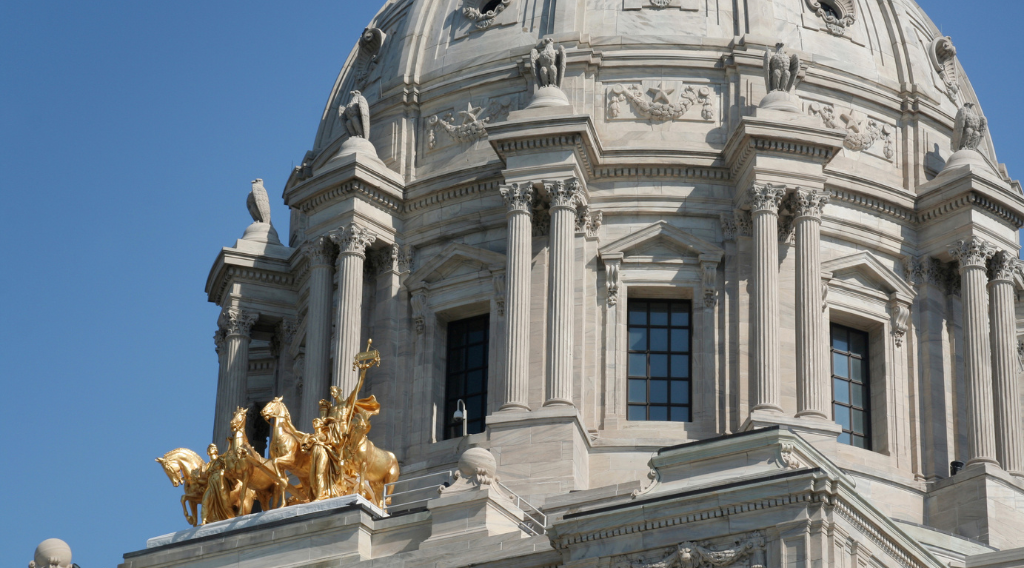Legislative Session Recap: Minnesota Makes Additional EV Investments in 2024
August 13, 2024 | Carolyn Berninger | Policy

Minnesota’s 2024 legislative session adjourned on May 20, with the passage of a 1,430-page omnibus bill package and several smaller bill packages wrapping up the historic 2023-2024 biennium. The past two years of policymaking in Minnesota were marked by unified Democrat-Farmer-Labor control of state government, substantial state and federal funding for transportation, and strong momentum for enacting climate policy.
Having passed an impressive slate of vehicle electrification policies during the first year of the biennium—also known as the “budget” year during which legislators and the governor propose and approve the state’s spending for the next two years—Minnesota legislators took a more measured approach in 2024. Still, the legislature passed a few additional bills this year aimed at investing in cleaner transportation and electrification statewide.
Continue reading to learn more about the policies that moved this year that we’re excited about.
Planning for electric buses at Metro Transit
The large omnibus bill package includes language directing Metro Transit to develop a plan to transition its bus fleet to zero-emission vehicles by 2035 in Minnesota’s seven-county metro area (see lines 104.22-106.23 of the omnibus bill). The plan must consider opportunities to maximize greenhouse gas emission reductions and prioritize the deployment of zero-emission buses in environmental justice areas, and it must also consider potential electric grid and workforce impacts.
An earlier version of the bill introduced by Representative Fue Lee would have required the Minnesota Department of Transportation and transit agencies to procure only zero-emission buses starting in 2030. Drive Electric Minnesota testified in support of that language in a committee hearing. However, the bill language was dialed back to the final, less ambitious planning requirements during end-of-session negotiations. These planning efforts will still be useful as Metro Transit considers how to electrify its bus fleet moving forward.
Increasing recovery of critical materials for clean energy technologies
Another bill package, the Environment and Natural Resources supplemental budget bill, created a Critical Materials Recovery Advisory Task Force consisting of 15 state agency, tribal, and stakeholder members (see lines 5.1-5.7 and 59.13-61.16). The task force will advise the Minnesota Pollution Control Agency on policy and program options to increase the recovery of critical materials from end-of-life products. Critical materials include minerals like lithium, cobalt, and nickel that are considered at high risk for supply chain disruption and that are integral for clean energy technologies like solar panels, wind turbines, and electric vehicles, as determined by the United States Secretary of Energy.
The task force will develop a road map to achieve domestic recovery of critical materials, investigate emerging technologies, evaluate the costs and benefits of various recovery methods, and identify infrastructure needs to enable materials recovery. A report detailing the findings will be published in December 2025. This legislation aligns with the Biden Administration’s efforts to secure more sustainable domestic critical materials production, processing, and recycling.
Investing in electric lawn care and snow removal equipment
The Environment and Natural Resources supplemental budget bill also appropriated $1 million to establish a rebate program for electric lawn and snow removal equipment (see lines 5.27-6.10). The legislation also requires the Commissioner of the Minnesota Pollution Control Agency to engage with environmental justice communities to design eligibility criteria to ensure the program benefits those communities. Electrifying equipment like lawnmowers and other machinery has multiple benefits, including quieter operation, lower maintenance costs, and, of course, less air pollution.
Adopting EV-ready residential building codes
This year, Drive Electric Minnesota supported House File 3439, authored by Representative Rehm and Senator Mitchell, which would have required the state to adopt EV-ready building code requirements for all new residential buildings. This would have built upon a 2023 law that requires the Minnesota Department of Labor and Industry (DLI) to adopt EV-ready requirements for new commercial buildings and multifamily buildings with four or more units—DLI will implement that legislation via an administrative rulemaking in 2026.
Ultimately, the bill expanding EV-readiness requirements to all new residential buildings did not make it into the final agreement at the end of session. However, in a parallel administrative process, the Construction Codes Advisory Council at DLI recently voted to approve a code change proposal submitted by clean energy organization Fresh Energy. The proposal asks the state to establish rules for new single- and two-family homes and townhouses to provide an “EV-ready” or “EV-capable” space. This rulemaking will ultimately serve a similar goal as House File 3439 by expanding requirements to all residential buildings. Drive Electric Minnesota will monitor that process to identify opportunities for input and ensure the state sets meaningfully strong requirements.
Curbing copper wire theft
Finally, the Cannabis Committee’s omnibus bill included a provision to curb copper wire theft in Minnesota (see lines 152.5-153.29). The language requires anyone selling copper to obtain a state-issued license, limiting the marketplace to those buying and selling copper legally. This is in response to growing concerns about copper wire theft in the state and nationally, as thieves have increasingly targeted EV charging stations and other public infrastructure, often rendering the infrastructure unusable.
Looking ahead to the 2025 Minnesota legislative session
Now that the 2024 session has adjourned, Drive Electric Minnesota is already thinking about what’s next for the state in terms of electrification policy. The coalition is meeting over the summer and fall to determine our slate of policy priorities for the 2025 session and consider how best to utilize our collective resources for the most impact.
Want to support the coalition’s efforts in Minnesota? Sign up for legislative action alerts to receive communications about opportunities to contact your representatives!
